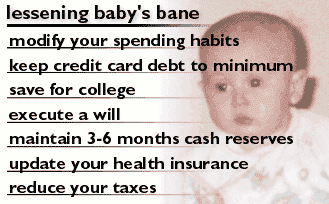|
It's a ($200,000) boy!
|
 |
October 5, 1998: 10:07 a.m. ET
With sound financial planning, baby doesn't have to bust your budget
|
NEW YORK (CNNfn) - Babies may be cuddly, cute and life-affirming; but from a budgetary standpoint they are the ultimate deadbeats, siphoning from the family finances with reckless, drooling abandon.
There's food to be slobbered, clothes to be soiled and furniture to be refurbished - not to mention hospital stays, diapers, toys, well-baby visits and immunizations. And some 20 years down the road there's that Mother of All Budget-Busters: College.
Over time, costs can stack up, reaching $200,000 or more over the course of a child's dependent life in your home.
With forethought, and modest changes in your spending habits, however, baby doesn't have to be a financial bane. As any financial planner will attest, the future is never too far off when it comes to laying the financial groundwork for a new member of the family.
"The earlier you start, the easier a time you're going to have, the more flexibility you'll have," said Carmen Petote, a certified financial planner with Allegiance Financial Advisers Inc., based in Pittsburgh, Penn.

While all this may seem obvious, the impulse, Petote said, is to procrastinate: "You've got to give people something to save for. We are all very busy - today is just that kind of a world - and we all just want to get through the day, get through the week."
Of IRAs and tax-exempt trusts
Education, says Petote, should be a clear priority. With college costs expected to nearly triple over the next 18 years, parents who begin socking away savings early, in either an Education IRA or a tax-exempt trust fund, will reap the benefits of higher interest rates and end up paying less.
For instance, a couple that puts aside $50 a month from the day their child is born will end up shelling out about half the amount as a couple that waits five years before it starts saving.
Several mutual funds allow investments of $500 or less if the fund is held as a custodial account for a child, according to Morningstar, a service that rates mutual funds. Gabelli Asset and Gabelli Growth are two funds managed by Gabelli Funds Inc. that provide five-year averages of around 15 percent.
Three funds run by Neuberger & Berman - Focus, Partners and Guardian - have posted 17 to 18 percent growth averages over the past five years.
Having a baby doesn't just mean an endless string of sleepless nights. It also means you'll have to start living a little more frugally now in order to stretch dollars further in years to come.
"People must realize that they need to save more than they spend," said Thomas O'Reilly, a personal financial adviser at American Express Financial Services. "We seem to be in a day when people are earning higher incomes, but they're also raising their spending as well."
Consolidate debts, sock away reserves
As you start your nine-month countdown to parenthood, start building a cash reserve.
"If you're about to start a family, you'll have some emergency needs," said O'Reilly. "Keep three to six months of committed expenses in a liquid account … maybe short-term CDs."
Some parents may temporarily choose to put less money into a 401(k) retirement plan , in order to free up cash in a baby's earliest - and costliest - years.
Estate planning is also a crucial concern when planning for a child. This includes the sometimes discomforting task of preparing a will.
"Having a will is one of the most important things," says O'Reilly. "(However), it's not something that's really thought about. It's a morbid subject and (parents) don't really feel comfortable."
A will should include a guardianship provision for your child and a power of attorney clause. In the absence of such provisions, the fate of your child will be left in a court's hands if you or your spouse cannot care for him or her.
Most health insurance plans provide for maternity coverage under the umbrella of well-baby coverage plans. Nonetheless, if you're insured at your workplace, check your plan and see if you need to add coverage for your baby. Health carriers normally require notification of a baby's arrival. Without it, you may find your child suddenly cut off.
The day-care quandary
Health insurers generally charge a uniform price for a child under 18 years of age, Petote says.
As for day care, Babycenter.com, an Internet advisory service for expectant parents, says that in a dual-income family, if one parent makes less than $25,000, it may not make sense to enroll a baby in day care. An ideal solution, says Petote, would be enlisting a nearby relative to care for the baby, though he acknowledges that's not often possible.
A couple of final considerations: Disability insurance can help you meet ends against a work-stopping injury. It continues to pay after other work-related benefits expire.
Also, don't forget that baby's dependent status entitles you to a sizable deduction on your income tax form. You should also ask your adviser about childcare credits.
And how about life insurance for the new arrival? Generally, Petote says, don't waste your money.
"You have to look at the objective of why you have (life insurance)," he says. "The child does not make any income, so income replacement is not a reason to get life insurance for the child."
See? The little monster is saving you some money already.
--By staff writer Douglas Herbert
|
|
|
|
|
 |

|

